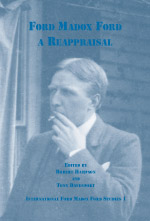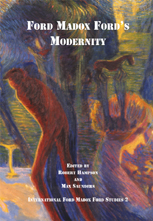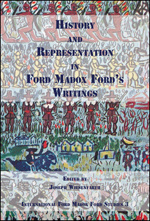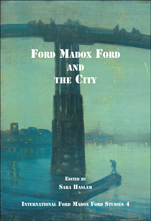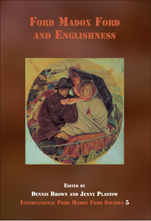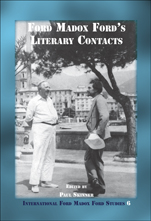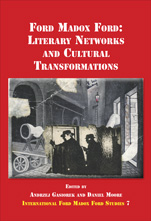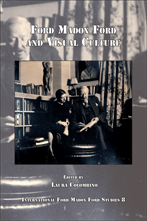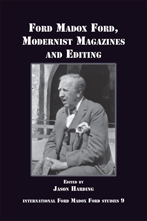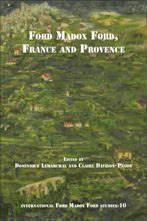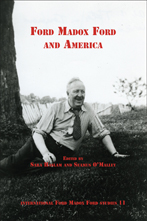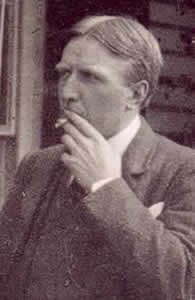 This new series has been published annually since 2002 by the Ford Madox Ford Society in association with Editions Rodopi B.V. in Amsterdam and New York. It aims to provide a forum for the best criticism devoted to Ford’s work, life and milieu. It is distributed to members of the Ford Madox Ford Society in exchange for their annual subscription, and is also available for sale from the Society and from the Publishers. Contributions are peer-reviewed. For further information about the Society and how to join it, please visit www.fordmadoxfordsociety.org/
This new series has been published annually since 2002 by the Ford Madox Ford Society in association with Editions Rodopi B.V. in Amsterdam and New York. It aims to provide a forum for the best criticism devoted to Ford’s work, life and milieu. It is distributed to members of the Ford Madox Ford Society in exchange for their annual subscription, and is also available for sale from the Society and from the Publishers. Contributions are peer-reviewed. For further information about the Society and how to join it, please visit www.fordmadoxfordsociety.org/
International Ford Madox Ford Studies
General Editor: Max Saunders
Ford Madox Ford has as often been a subject of controversy as a candidate for literary canonization. He was, nonetheless, a major presence in early twentieth-century literature, and he has remained a significant figure in the history of modern English and American literature for over a century now. Throughout that time he has been written about – not just by critics, but often by other gifted writers, such as Robert Lowell, Graham Greene, Gore Vidal, A. S. Byatt, and Julian Barnes. His two acknowledged masterpieces have remained in print since the 1940s. The Good Soldier now regularly figures in studies of Modernism and on its syllabuses. Parade’s End has been increasingly recognized as comparably important. It was described by Malcolm Bradbury as ‘a central Modernist novel of the 1920s, in which it is exemplary’; by Anthony Burgess as ‘the finest novel about the First World War’; and by Samuel Hynes as ‘the greatest war novel ever written by an Englishman’.
During the last decade or so, there has been a striking resurgence of interest in Ford and in the multifarious aspects of his work. As befits such an international and internationalist phenomenon as Ford himself, this critical attention has been markedly international, manifesting itself not only in the United Kingdom and the U. S. A., but in Continental Europe and beyond. Many of his works have not only been republished in their original language, but also translated into more than a dozen others.
The founding of both the Society and the annual series reflects this increasing interest in Ford’s writing and the wider understanding of his role in literary history.
Each volume is normally be based upon a particular theme or issue, relating aspects of Ford’s work, life, and contacts, to broader concerns of his time.
Volumes already published:
Ford Madox Ford: A Reappraisal
Edited by Robert Hampson and Tony Davenport
Amsterdam/New York, NY, 2002, VIII, 191 pp.
Focuses on some of the best of his poetry, writings on art, and less well-known fiction: A Call, The Simple Life Limited, The Marsden Case, and The Rash Act. Subsequent volumes will include:
Ford Madox Ford’s Modernity
Edited by Robert Hampson and Max Saunders. Foreword by Sir Frank Kermode. Amsterdam/New York, NY, 2003, X, 313 pp.
History and Representation in Ford Madox Ford’s Writings
Edited by Joseph Wiesenfarth
Amsterdam/New York, NY, 2004, XI, 241 pp.
Ford Madox Ford and the City
ed. Sara Haslam
Amsterdam/New York, NY, 2005, 256 pp.
Includes three of Ford’s ‘Portraits of Cities’, two of which are published here for the first time.
Ford Madox Ford and Englishness
ed. Dennis Brown and Jenny Plastow
Amsterdam/New York, NY, 2006, 304 pp.
Ford Madox Ford’s Literary Contacts
ed. Paul Skinner
Amsterdam/New York, NY, 2007, 276 pp.
Ford Madox Ford:Literary Networks and Cultural Transformations
ed. Andrzej Gasiorek and Daniel Moore
Amsterdam/New York, NY, 2008, 283 pp.
Ford Madox Ford and Visual Culture
ed. Laura Colombino
Amsterdam/New York 2009, 269 pp.
includes 40 illustrations
Ford Madox Ford, Modernist Magazines and Editing
ed. Jason Harding
Amsterdam/New York 2010, 284 pp.
Ford Madox Ford, France and Provence
ed. Dominique Lemarchal and Claire Davison-Pégon
Amsterdam/New York 2011, 299 pp.
Ford Madox Ford and America
ed. Sara Haslam and Seamus O’Malley
Amsterdam/New York 2012, 277 pp.
Future volumes are planned on:
The Edwardian Ford Madox Ford
Ford and the First World War
The Good Soldier
The General Editor welcomes suggestions about future volumes or contributions. Please write to: max.saunders@kcl.ac.uk
Links:
Guidance for contributors on style and abbreviations
The web site of the Ford Society is: http://www.open.ac.uk/Arts/fordmadoxford-society/
